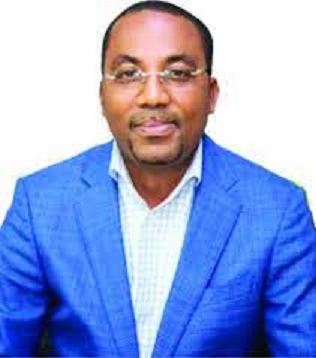The Managing Director, Nigerian Ports Authority (NPA), Mohammed Bello-Koko says the downstream and upstream operations of the maritime sector have to be fully explored for Nigeria to maximise the benefits of the Blue Economy.
Bello-Koko made the submission in Lagos during a paper presentation titled, “Nigeria and the Evolving New Port Order” at the just concluded Association of Maritme Journalists of Nigeria (AMJON) 2022 Annual Conference and Awards, with the theme: “Maximizing Nigeria’s Blue Economy Through Automation”.
The NPA MD, who was represented by the General Manager, Corporate and Strategic Communications NPA, Yemisi Oyinlola, noted that the Blue Economy is an alternative economic model for sustainable development and poverty eradication.
According to Bello-Koko, “Maritime activities made up of downstream and upstream operations. Downstream operation principally made up of Port operation and Bunkering, while the upstream consists of Insurance, connectivity logistics and shipping activities.
“Ironically, Nigeria operates only in the port operation aspect of downstream operation. Even the port operation is not performing optimally due to a number of inherent challenges.
“Today, Nigeria has not fully utilized the opportunity offered by the upstream maritime economy. This explains why Maritime sector has not contributed substantially to Nigerian economy. In an effort to reposition Nigerian economy particularly the maritime sector, the managers of our economy need to pay requisite attention.
“For Nigeria to maximize the benefits of blue economy, both downstream and upstream operations have to be fully explored. Shipping business must be taken beyond mere vessel and cargo handling at the port but must include other services such as bunkering, insurance, hinterland connectivity etc.”
Speaking further, he pointed out that Oceans, as significant means of transport in global trade, provide the world’s population with food and livelihood; hence an effective tool for poverty eradication and sustainable economic development.
In his words, “Ironically, Nigeria with a coastline of approximately 853km facing the Atlantic Ocean has been widely reported in many articles as the “World Headquarters of Poverty”.
“What then could be the problem and what is the way forward? This should be the concern of every participant at this Conference and I have no doubt that the outcome of this conference will be beneficial to Nigeria and Nigerians considering the role of journalism in social and economic re-engineering of our nation”.
Bello-Koko noted that seaports constitute the most important transit points between national and international economies, adding that protecting the ocean from pollution requires executing actions that enhance biodiversity through technology, investment and the development of social, environmental and economic strategies, which is the main focus of the Blue Economy.
He pointed out that seaports as integrator of the world economic market are at the centre of development of social, environmental and economic policies, adding that port development is strategic to the coordination and achievement of the traditional activities of the Blue Economy.
“Shipping industry is a huge and complex one constantly being affected by global trends and technological advancement, the complexity and need to become more competitive and cost-effective necessitates its continual change and adaptation to meet the demands of world trade.” Bello-Koko stated.
He further disclosed that the NPA Management has embarked on various initiatives such as the ongoing rehabilitation of port access roads to improve hinterland connectivity, rail linkage to Apapa Port Complex to address the pervading gridlock and facilitate cargo evacuation…
The Electronic Truck Call-Up System (ETO), Scaling up Port capacity via investment in Deep-sea Ports among others, towards repositioning Nigerian Ports on the path of competitiveness.
In his words, “It is pertinent to note that with the backing of the government through the Federal Ministry of Transportation and the technical advisory of the International Maritime Organization (IMO), the Nigerian Ports Authority has kick-started the process of establishing Port Community System (PCS).
“The system will bring together all stakeholders in the port community and facilitate ease of doing business in the ports. Our role as port players is to position the port on the part of competitiveness with focus on quality port services and right pricing. This is what underpins trade facilitation ideals which would ultimately expand the frontiers of trade and foster economic growth.









Comment here